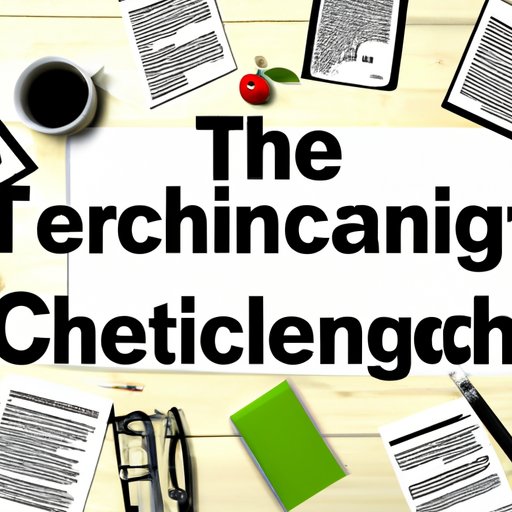Introduction
Technical writing is the process of creating documents related to the use and operation of technological products or services. It includes creating user manuals, instructional guides, and other important documents. As technology continues to advance, the demand for highly skilled technical writers has grown significantly. Obtaining a technical writing certification can help individuals stand out in this competitive field and open up new career opportunities.
Is a Technical Writing Certification Worth It?
The decision to pursue a technical writing certification should not be taken lightly. It requires a significant investment of time and money, so it’s important to weigh the pros and cons before making a commitment. On the plus side, having a technical writing certification can make you more attractive to potential employers and give you access to higher paying jobs. Additionally, having a technical writing certification may open doors to more specialized fields, such as software documentation and medical writing.
On the downside, there are some drawbacks to getting a technical writing certification. For one thing, the cost of tuition and materials can add up quickly. Additionally, the competition in the field is increasing, so it may be difficult to find a job with just a technical writing certification. Finally, the certification itself may not be enough to guarantee success in the field; employers may still require additional experience or qualifications.
What to Expect from a Technical Writing Certification Program
When considering a technical writing certification program, it’s important to understand the common elements of these programs. Most courses include instruction in topics such as grammar, punctuation, and style; research methods for technical writing; technical terminology; and document design and layout. Additionally, many programs offer hands-on experience with writing projects, such as creating user manuals or product descriptions.
It’s also important to understand the prerequisites for a technical writing certification. In general, most programs require at least a bachelor’s degree in a related field, such as English, communications, or journalism. Some programs may also require additional coursework or experience in the field.
An Overview of Different Types of Technical Writing Certifications
There are several types of technical writing certifications available, each with its own specific requirements and benefits. The most commonly offered certifications include Certified Technical Writer (CTW), Technical Communication Certificate (TCC), and Professional Technical Writer (PTW). All three certifications share similar core competencies, but each also has its own set of unique requirements.
For example, the CTW certification requires applicants to have at least two years of professional experience in the field, while the TCC certification does not. The PTW certification is the most advanced of the three, and requires applicants to have a master’s degree in addition to five years of professional experience.

A Guide to Choosing the Right Technical Writing Certification
Choosing the right technical writing certification can be a daunting task. The first step is to identify your professional goals and determine which certification best meets those goals. Do you want to specialize in a particular area of technical writing, such as software documentation? Are you looking to advance your career by obtaining a higher level of certification? Understanding your long-term objectives will help you narrow down your options.
Once you’ve identified your goals, the next step is to research available programs. Look for programs that offer comprehensive instruction in the topics you need to learn, as well as hands-on experience with real-world projects. Additionally, make sure the program is accredited by a reputable organization.

How to Prepare for a Technical Writing Certification Exam
Once you’ve chosen a certification program, the next step is to prepare for the exam. Start by familiarizing yourself with the exam content, including the topics that will be covered and the format of the questions. Then, create a study plan that outlines the material you need to review and the amount of time you need to dedicate to studying each day.
Finally, practice taking sample exams to get comfortable with the type of questions you’ll be asked on the actual test. This will help you identify any areas where you need to focus your studies, and ensure that you’re prepared for the exam.

Understanding the Value of Technical Writing Certification in the Workplace
Having a technical writing certification can be an invaluable asset in the workplace. With a certification, you’ll be better equipped to handle complex technical writing tasks, and employers will be more likely to recognize your expertise. Additionally, having a technical writing certification can provide increased job security and improved professional recognition.
Conclusion
Obtaining a technical writing certification can be a beneficial investment for those seeking to advance their careers in this increasingly competitive field. Knowing what to expect from a technical writing certification program and how to prepare for the exam can help ensure success. Ultimately, having a technical writing certification can provide numerous benefits, from increased job security to improved recognition in the workplace.
(Note: Is this article not meeting your expectations? Do you have knowledge or insights to share? Unlock new opportunities and expand your reach by joining our authors team. Click Registration to join us and share your expertise with our readers.)
